unit 8公关文稿的翻译
- 格式:ppt
- 大小:2.66 MB
- 文档页数:32

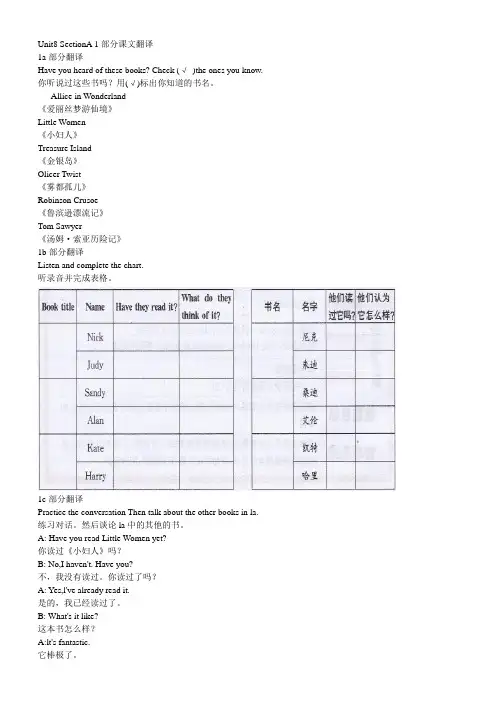
Unit8 SectionA 1部分课文翻译1a部分翻译Have you heard of these books? Check (√)the ones you know. 你听说过这些书吗?用(√)标出你知道的书名。
___Allice in Wonderland《爱丽丝梦游仙境》Little Women《小妇人》Treasure Island《金银岛》Olicer Twist《雾都孤儿》Robinson Crusoe《鲁滨逊漂流记》Tom Sawyer《汤姆·索亚历险记》1b部分翻译Listen and complete the chart.听录音并完成表格。
1c部分翻译Practice the conversation Then talk about the other books in la. 练习对话。
然后谈论la中的其他的书。
A: Have you read Little Women yet?你读过《小妇人》吗?B: No,I haven't. Have you?不,我没有读过。
你读过了吗?A: Yes,l've already read it.是的,我已经读过了。
B: What's it like?这本书怎么样?A:lt's fantastic.2a部分翻译Listen Mrho has read these books?听录音。
谁读过这些书?圈出名字。
1. Treasure Island《金银岛》Mark/Tina马克/蒂娜2. Oliver Turist《雾都孤儿》Mark/Tina马克/蒂娜3. Robinson Crusoe《鲁滨逊漂流记》Mark/Tina马克/蒂娜4. Tom Sawyer《汤姆·索亚历险记》Mark/Tina马克/蒂娜2b部分翻译Listen again and write T for true and F for false.再听一遍录音。
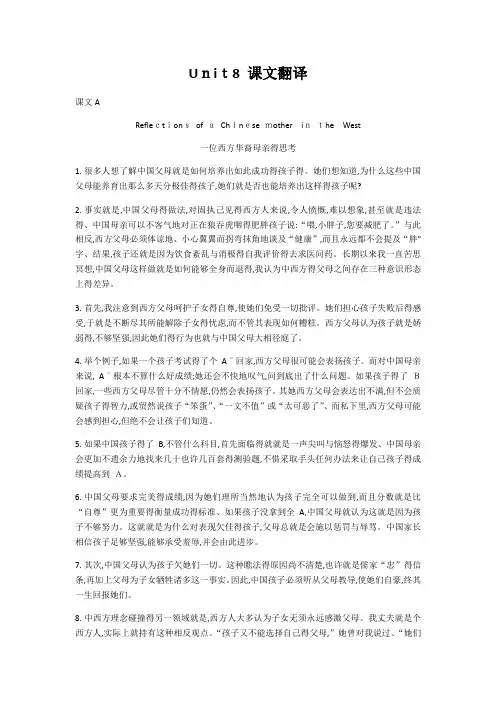
Unit8 课文翻译课文AReflectionsof aChinese mother inthe West一位西方华裔母亲得思考1.很多人想了解中国父母就是如何培养出如此成功得孩子得。
她们想知道,为什么这些中国父母能养育出那么多天分极佳得孩子,她们就是否也能培养出这样得孩子呢?2.事实就是,中国父母得做法,对固执己见得西方人来说,令人愤慨,难以想象,甚至就是违法得、中国母亲可以不客气地对正在狼吞虎咽得肥胖孩子说:“喂,小胖子,您要减肥了。
”与此相反,西方父母必须体谅地、小心翼翼而拐弯抹角地谈及“健康”,而且永远都不会提及“胖"字、结果,孩子还就是因为饮食紊乱与消极得自我评价得去求医问药。
长期以来我一直苦思冥想,中国父母这样做就是如何能够全身而退得,我认为中西方得父母之间存在三种意识形态上得差异。
3.首先,我注意到西方父母呵护子女得自尊,使她们免受一切批评。
她们担心孩子失败后得感受,于就是不断尽其所能解除子女得忧虑,而不管其表现如何糟糕。
西方父母认为孩子就是娇弱得,不够坚强,因此她们得行为也就与中国父母大相径庭了。
4.举个例子,如果一个孩子考试得了个Aˉ回家,西方父母很可能会表扬孩子。
而对中国母亲来说, Aˉ根本不算什么好成绩;她还会不快地叹气,问到底出了什么问题。
如果孩子得了B回家,一些西方父母尽管十分不情愿,仍然会表扬孩子。
其她西方父母会表达出不满,但不会质疑孩子得智力,或贸然说孩子“笨蛋”、“一文不值”或“太可恶了”、而私下里,西方父母可能会感到担心,但绝不会让孩子们知道、5.如果中国孩子得了B,不管什么科目,首先面临得就就是一声尖叫与恼怒得爆发、中国母亲会更加不遗余力地找来几十也许几百套得测验题,不惜采取手头任何办法来让自己孩子得成绩提高到A。
6.中国父母要求完美得成绩,因为她们理所当然地认为孩子完全可以做到,而且分数就是比“自尊”更为重要得衡量成功得标准、如果孩子没拿到全A,中国父母就认为这就是因为孩子不够努力。
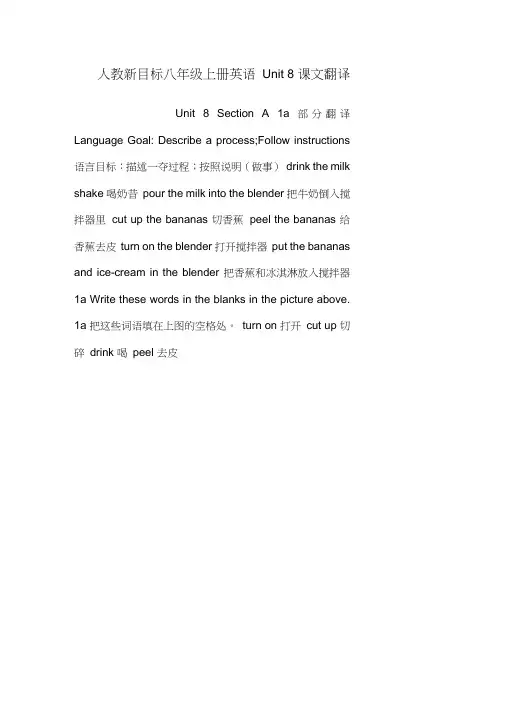
人教新目标八年级上册英语Unit 8 课文翻译Unit 8 Section A 1a 部分翻译Language Goal: Describe a process;Follow instructions 语言目标:描述一夺过程;按照说明(做事)drink the milk shake 喝奶昔pour the milk into the blender 把牛奶倒入搅拌器里cut up the bananas 切香蕉peel the bananas 给香蕉去皮turn on the blender 打开搅拌器put the bananas and ice-cream in the blender 把香蕉和冰淇淋放入搅拌器1a Write these words in the blanks in the picture above. 1a 把这些词语填在上图的空格处。
turn on 打开cut up 切碎drink 喝peel 去皮pour倒put 放Unit 8 Section A 1b 部分翻译Listen and put the instructions in order. 听录音,把操作说明排序。
Turn on the blender. 打开搅拌器。
Cut up the bananas. 切香蕉。
Drink the milk shake.喝奶昔。
Pour the milk into the blender. 把牛奶倒入搅拌器。
Put the bananas and ice-cream in the blender. 把香蕉和冰洪淋放入搅拌器。
Peel three bananas. 剥三根香蕉。
Unit 8 Section A 2c 部分课文翻译Ask and answer questions about how to make fruit salad. 关于怎样制作水果沙拉提问并回答。
A:Let's make fruit salad.A:让我们制作水果沙拉吧。
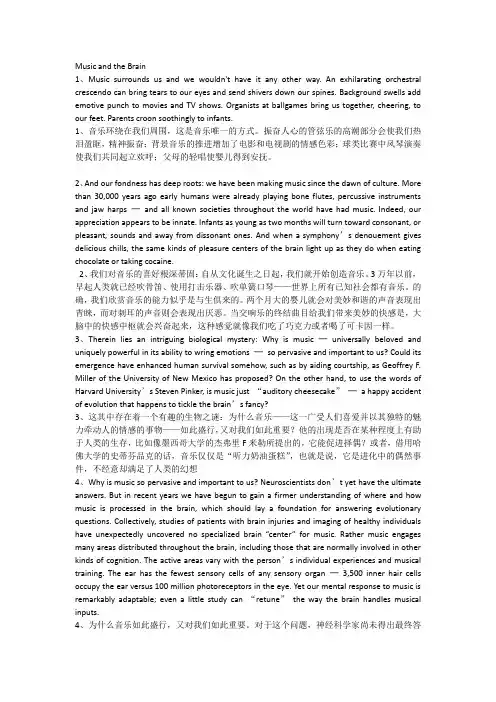
Music and the Brain1、Music surrounds us and we wouldn't have it any other way. An exhilarating orchestral crescendo can bring tears to our eyes and send shivers down our spines. Background swells add emotive punch to movies and TV shows. Organists at ballgames bring us together, cheering, to our feet. Parents croon soothingly to infants.1、音乐环绕在我们周围,这是音乐唯一的方式。
振奋人心的管弦乐的高潮部分会使我们热泪盈眶,精神振奋;背景音乐的推进增加了电影和电视剧的情感色彩;球类比赛中风琴演奏使我们共同起立欢呼;父母的轻唱使婴儿得到安抚。
2、And our fondness has deep roots: we have been making music since the dawn of culture. More than 30,000 years ago early humans were already playing bone flutes, percussive instruments and jaw harps ─and all known societies throughout the world have had music. Indeed, our appreciation appears to be innate. Infants as young as two months will turn toward consonant, or pleasant, sounds and away from dissonant ones. And when a symphony’s denouement gives delicious chills, the same kinds of pleasure centers of the brain light up as they do when eating chocolate or taking cocaine.2、我们对音乐的喜好根深蒂固:自从文化诞生之日起,我们就开始创造音乐。
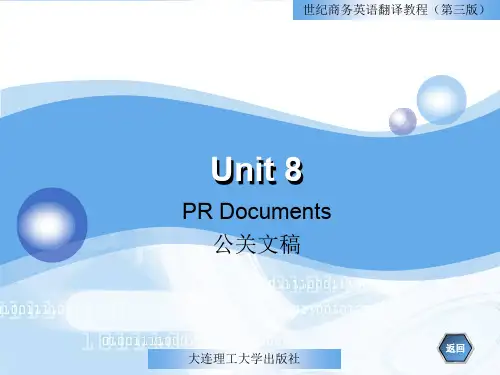
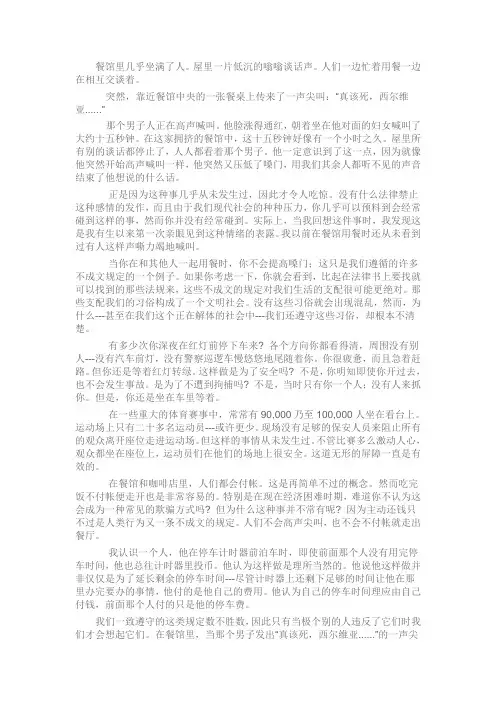
餐馆里几乎坐满了人。
屋里一片低沉的嗡嗡谈话声。
人们一边忙着用餐一边在相互交谈着。
突然,靠近餐馆中央的一张餐桌上传来了一声尖叫:“真该死,西尔维亚......”那个男子人正在高声喊叫。
他脸涨得通红,朝着坐在他对面的妇女喊叫了大约十五秒钟。
在这家拥挤的餐馆中,这十五秒钟好像有一个小时之久。
屋里所有别的谈话都停止了,人人都看着那个男子。
他一定意识到了这一点,因为就像他突然开始高声喊叫一样,他突然又压低了嗓门,用我们其余人都听不见的声音结束了他想说的什么话。
正是因为这种事几乎从未发生过,因此才令人吃惊。
没有什么法律禁止这种感情的发作,而且由于我们现代社会的种种压力,你几乎可以预料到会经常碰到这样的事,然而你并没有经常碰到。
实际上,当我回想这件事时,我发现这是我有生以来第一次亲眼见到这种情绪的表露。
我以前在餐馆用餐时还从未看到过有人这样声嘶力竭地喊叫。
当你在和其他人一起用餐时,你不会提高嗓门;这只是我们遵循的许多不成文规定的一个例子。
如果你考虑一下,你就会看到,比起在法律书上要找就可以找到的那些法规来,这些不成文的规定对我们生活的支配很可能更绝对。
那些支配我们的习俗构成了一个文明社会。
没有这些习俗就会出现混乱,然而,为什么---甚至在我们这个正在解体的社会中---我们还遵守这些习俗,却根本不清楚。
有多少次你深夜在红灯前停下车来? 各个方向你都看得清,周围没有别人---没有汽车前灯,没有警察巡逻车慢悠悠地尾随着你。
你很疲惫,而且急着赶路。
但你还是等着红灯转绿。
这样做是为了安全吗? 不是,你明知即使你开过去,也不会发生事故。
是为了不遭到拘捕吗? 不是,当时只有你一个人;没有人来抓你。
但是,你还是坐在车里等着。
在一些重大的体育赛事中,常常有90,000乃至100,000人坐在看台上。
运动场上只有二十多名运动员---或许更少。
现场没有足够的保安人员来阻止所有的观众离开座位走进运动场。
但这样的事情从未发生过。
不管比赛多么激动人心,观众都坐在座位上,运动员们在他们的场地上很安全。
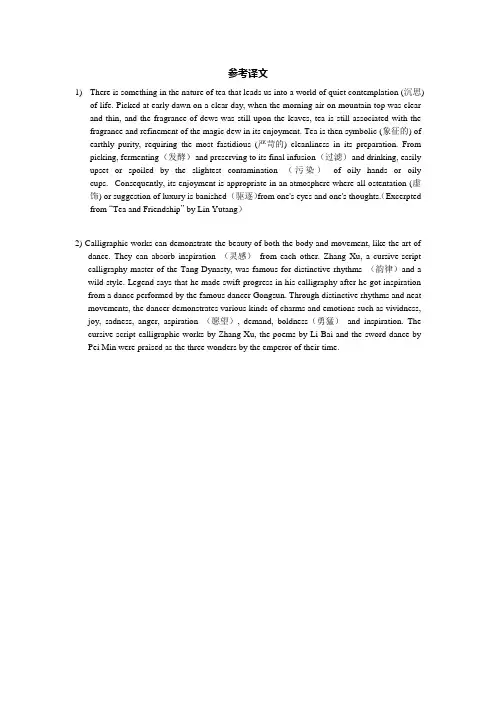
参考译文1)There is something in the nature of tea that leads us into a world of quiet contemplation (沉思)of life. Picked at early dawn on a clear day, when the morning air on mountain top was clear and thin, and the fragrance of dews was still upon the leaves, tea is still associated with the fragrance and refinement of the magic dew in its enjoyment. Tea is then symbolic (象征的) of earthly purity, requiring the most fastidious (严苛的) cleanliness in its preparation. From picking, fermenting (发酵)and preserving to its final infusion (过滤)and drinking, easily upset or spoiled by the slightest contamination (污染)of oily hands or oily cups. Consequently, its enjoyment is appropriate in an atmosphere where all ostentation (虚饰) or suggestion of luxury is banished (驱逐)from one's eyes and one's thoughts.(Excerpted from “Tea and Friendship” by Lin Yutang)2) Calligraphic works can demonstrate the beauty of both the body and movement, like the art ofdance. They can absorb inspiration (灵感)from each other. Zhang Xu, a cursive-script calligraphy master of the Tang Dynasty, was famous for distinctive rhythms (韵律)and a wild style. Legend says that he made swift progress in his calligraphy after he got inspiration from a dance performed by the famous dancer Gongsun. Through distinctive rhythms and neat movements, the dancer demonstrates various kinds of charms and emotions such as vividness, joy, sadness, anger, aspiration (愿望), demand, boldness(勇猛)and inspiration. The cursive-script calligraphic works by Zhang Xu, the poems by Li Bai and the sword dance by Pei Min were praised as the three wonders by the emperor of their time.。
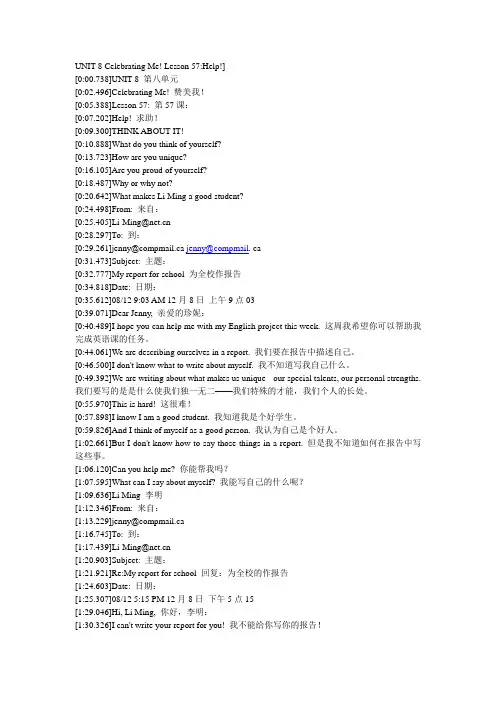
UNIT 8 Celebrating Me! Lesson 57:Help!][0:00.738]UNIT 8 第八单元[0:02.496]Celebrating Me! 赞美我![0:05.388]Lesson 57: 第57课:[0:07.202]Help! 求助![0:09.300]THINK ABOUT IT![0:10.888]What do you think of yourself?[0:13.723]How are you unique?[0:16.105]Are you proud of yourself?[0:18.487]Why or why not?[0:20.642]What makes Li Ming a good student?[0:24.498]From: 来自:[0:25.405]Li-Ming@[0:28.297]To: 到:[0:29.261]jenny@compmail.ca jenny@compmail. ca[0:31.473]Subject: 主题:[0:32.777]My report for school 为全校作报告[0:34.818]Date: 日期:[0:35.612]08/12 9:03 AM 12月8日上午9点03[0:39.071]Dear Jenny, 亲爱的珍妮:[0:40.489]I hope you can help me with my English project this week. 这周我希望你可以帮助我完成英语课的任务。
[0:44.061]We are describing ourselves in a report. 我们要在报告中描述自己。
[0:46.500]I don't know what to write about myself. 我不知道写我自己什么。
[0:49.392]We are writing about what makes us unique - our special talents, our personal strengths. 我们要写的是是什么使我们独一无二——我们特殊的才能,我们个人的长处。
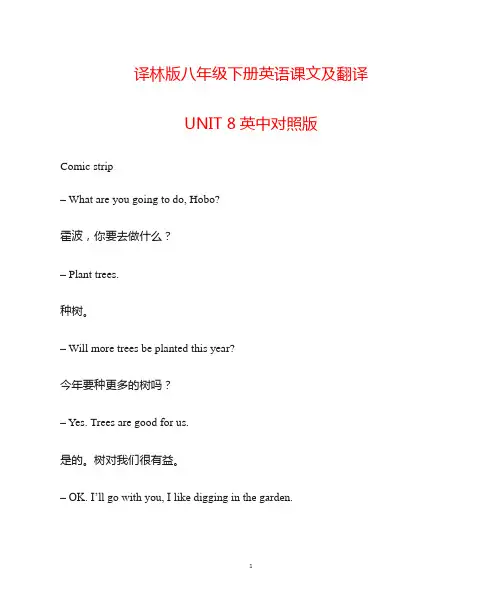
译林版八年级下册英语课文及翻译UNIT 8英中对照版Comic strip– What are you going to do, Hobo?霍波,你要去做什么?– Plant trees.种树。
– Will more trees be planted this year?今年要种更多的树吗?– Yes. Trees are good for us.是的。
树对我们很有益。
–OK. I’ll go with you, I like digging in the garden.好的。
我跟你一起去。
我喜欢在花园里挖洞。
– Are you serious?你是认真的吗?–Sure, I’ll plant breadfruit trees. Breadfruit … Yummy!当然。
我要种面包果树。
面包果……好吃!Welcome to the unit– What should we do to live a green life, class?同学们,对绿色生活我们应该做些什么呢?– My dad used to drive me to school, but now we take the underground.More and more families own cars and this causes serious air pollution.我的爸爸以前常常开车送我去上学,但是现在我们坐地铁了。
越来越多的家庭拥有汽车,导致严重的空气污染。
–I agree. It’s wise for people to choose public transport or ride bicycles.我同意。
人们选择公共交通或骑自行车是很明智的。
– I think we can take shorter showers to save water.我认为我们应该缩短淋浴时间,以节约用水。
– Yes. And we should remember to turn off the lights when we leave a room.是的。
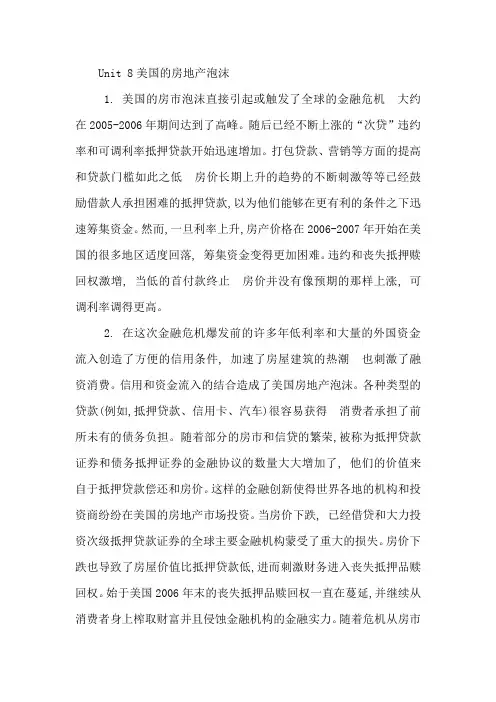
Unit 8美国的房地产泡沫1.在2005-2006年期间达到了高峰。
随后已经不断上涨的“次贷”违约率和可调利率抵押贷款开始迅速增加。
打包贷款、营销等方面的提高励借款人承担困难的抵押贷款,以为他们能够在更有利的条件之下迅速筹集资金。
然而,一旦利率上升,房产价格在2006-2007年开始在美国的很多地区适度回落, 筹集资金变得更加困难。
违约和丧失抵押赎回权激增, 的那样上涨, 可调利率调得更高。
2. 在这次金融危机爆发前的许多年低利率和大量的外国资金流入创造了方便的信用条件,资消费。
信用和资金流入的结合造成了美国房地产泡沫。
各种类型的贷款(例如,抵押贷款、信用卡、汽车)所未有的债务负担。
随着部分的房市和信贷的繁荣,被称为抵押贷款证券和债务抵押证券的金融协议的数量大大增加了, 他们的价值来自于抵押贷款偿还和房价。
这样的金融创新使得世界各地的机构和投资商纷纷在美国的房地产市场投资。
当房价下跌, 已经借贷和大力投资次级抵押贷款证券的全球主要金融机构蒙受了重大的损失。
房价下跌也导致了房屋价值比抵押贷款低,进而刺激财务进入丧失抵押品赎回权。
始于美国2006年末的丧失抵押品赎回权一直在蔓延,并继续从消费者身上榨取财富并且侵蚀金融机构的金融实力。
随着危机从房市球的损失总额估计在数万亿美元。
3. 当房市泡沫和信贷泡沫加剧,一系列的因素导致金融体系不断的扩展,而且变得越来越脆弱,其过程被称为金融体系化。
政策制定者们没有看到如投资银行、对冲基金,也称为影子银行系统的金融机构所扮演的越来越重要的角色。
有些专家认为这些机构为美国经济提供信贷,同样规则的约束。
这些机构以及某些规范银行也承担了大量的债务负抵押贷款证券损失的财务储蓄。
这些损失冲击了金融机构的贷款能力,减缓了经济发展。
对金融机构的稳定性的关注使得中央银行提供资金鼓励借贷和恢复商业票据市场的信心,这对商业运作提供资金至关重要。
政府也帮助金融机构摆脱困境和执行经济刺激计划, 承担额外的财政承诺。
商务英语unit8译⽂及答案参考译⽂Text A 这个选择适合你吗?吉姆和鲍伯在同⼀天开始为⼤陆企业⼯作,两⼈都是22岁并且毕业于同所⼤学获市场营销学位。
除了这些外两⼈很少有共同之处,吉姆性格内向,羞涩保守,⽽鲍伯性格外向,爱好交际。
数年来,吉姆发觉难以喜欢上这种总是与⼈打交道的⼯作,于是更换了⼯作并且再也没有过这份⼯作的念头。
鲍伯则⼀直呆在那个岗位直到他被提拔为市场部经理。
对于他来说,这种⼯作很有趣且具挑战性。
为什么市场营销的职业对于⼀些⼈来说是好的选择但对于有些⼈却不是呢?你曾经想过要选择什么样的职业吗?什么是职业?职业的概念有很多含义。
流⾏的含义是指⼀个⼈在选择⼯作时可能都会有向更⾼层次发展的想法,⽐如说挣更多的钱,承担更多的职责,获取更⾼的地位、名望和权⼒。
这个定义强调了⼀个⼈的职业在⼈的⼀⽣中占有着重要的作⽤。
怎样选择⼀门职业是⼀个不可轻视的重⼤决定,⽽这个问题也真正令⼈困惑不已。
吉姆就是⼀个很好的例⼦,他和鲍伯背景相同,为何他就不能卖出更多的产品呢?在选择职业时应该考虑⼏个因素,包括你的技能,兴趣,个⼈价值等等,这些对你的职业选择有很⼤的影响。
以下就是经常考虑的⼏个因素:技能确定⼀个⼈具有什么样的技能对于职业选择⾮常重要。
单纯地只是因为喜欢某个职业⽽不喜欢另⼀个职业来择业是远远不够的,⼀个⼈必须具备或能够开发其开展⼯作所需的技能。
是否他或她具备成为科学家,医师或⽣物学家的技能对于选择某个特定的职业发挥着重要的作⽤。
例如,你是善于解决复杂的技术问题,还是善于计划怎样实施某个项⽬抑或在培训他⼈时,你最拿⼿?这给了你⼀个提⽰:在你的职业⽣涯中你想使⽤哪些技能。
因此检查你的技能将有助于你了解哪种⼯作你最擅长,哪种技能你最在⾏。
兴趣⼯作的动机来源于兴趣。
常常你的兴趣会引导你去从事⼀份你喜欢的⼯作。
我们难以想象如果我们的⼯作和我们的兴趣完全不相配,那或许是⼀种痛苦。
⼈们在谋⽣的同时也在创造⽣活。
UNIT 8 Celebrating Me! Lesson 57:Help!][0:00.738]UNIT 8 第八单元[0:02.496]Celebrating Me! 赞美我![0:05.388]Lesson 57: 第57课:[0:07.202]Help! 求助![0:09.300]THINK ABOUT IT![0:10.888]What do you think of yourself?[0:13.723]How are you unique?[0:16.105]Are you proud of yourself?[0:18.487]Why or why not?[0:20.642]What makes Li Ming a good student?[0:24.498]From: 来自:[0:25.405]Li-Ming@[0:28.297]To: 到:[0:29.261]jenny@compmail.ca jenny@compmail. ca[0:31.473]Subject: 主题:[0:32.777]My report for school 为全校作报告[0:34.818]Date: 日期:[0:35.612]08/12 9:03 AM 12月8日上午9点03[0:39.071]Dear Jenny, 亲爱的珍妮:[0:40.489]I hope you can help me with my English project this week. 这周我希望你可以帮助我完成英语课的任务。
[0:44.061]We are describing ourselves in a report. 我们要在报告中描述自己。
[0:46.500]I don't know what to write about myself. 我不知道写我自己什么。
[0:49.392]We are writing about what makes us unique - our special talents, our personal strengths. 我们要写的是是什么使我们独一无二——我们特殊的才能,我们个人的长处。
20141018第八单元Transl ation of Text A陌生人的仁慈1 一个夏天,我正驱车从我的家乡加利福尼亚州的塔霍湖市前往新奥尔良。
行驶到沙漠中部时,我遇到了一个正站在路边的年轻人。
他竖起拇指请求搭车,另一只手里握着一个汽油罐。
我径直从他身边开了过去。
在这个国家曾经有一个时期,如果你对一个需要帮助的人置之不理,那你就被认为是一个愚蠢的人。
但现在,你帮助了别人,你就是一个愚蠢的人。
由于到处隐藏着歹徒、吸毒成瘾者、强奸犯和小偷,“我不想惹麻烦”就成了民族的箴言2 驶过了几个州后,我仍然在想着那个搭便车的旅行者。
把他束手无策留在沙漠并没有让我太烦扰。
让我烦扰的是,我是多么轻易的就下了这个决定。
我甚至都没有把脚从加速器上抬起来。
3 还会有人再停下来么?我很想知道。
我想起布兰奇-杜包尔斯的著名的台词“我总是非常依赖陌生人的仁慈”。
如今还会有人依赖陌生人的仁慈检验此事的一个方法就是让一个人不带钱,只依靠美国同胞的好心,从一个海岸到另一个海岸去旅行。
他将发现什么样的美国人呢?谁将会给他食物、提供住处、载他一路?4 这个想法激起我的好奇心。
5 在我步入37岁的那周,我意识到在我的一生中还从未冒过险。
因此我决定身无分文的从太平洋到大西洋旅行。
在这个金钱万能的国家,这将会是一次不花钱的旅行。
我将只接受别人提供的搭车、食物以及休息场所。
我最终的目的地将是被卡罗莱纳周的恐怖角,这是我整个旅行要克服的所有恐惧的一个象征。
6 1994年9月6日,我早早的起了床,动身前往金门桥。
我背上背了50镑重的行李和一个向过往的车辆展示我此行目的地的标牌“美国”。
7 六周的时间,我免费搭车82次,穿越了14个省4223英里。
Unit8 课文翻译课文AReflections of a Chinese mother in the West一位西方华裔母亲的思考1.很多人想了解中国父母是如何培养出如此成功的孩子的。
他们想知道,为什么这些中国父母能养育出那么多天分极佳的孩子,他们是否也能培养出这样的孩子呢?2.事实是,中国父母的做法,对固执己见的西方人来说,令人愤慨,难以想象,甚至是违法的。
中国母亲可以不客气地对正在狼吞虎咽的肥胖孩子说:“喂,小胖子,你要减肥了。
”与此相反,西方父母必须体谅地、小心翼翼而拐弯抹角地谈及“健康”,而且永远都不会提及“胖”字。
结果,孩子还是因为饮食紊乱和消极的自我评价得去求医问药。
长期以来我一直苦思冥想,中国父母这样做是如何能够全身而退的,我认为中西方的父母之间存在三种意识形态上的差异。
3.首先,我注意到西方父母呵护子女的自尊,使他们免受一切批评。
他们担心孩子失败后的感受,于是不断尽其所能解除子女的忧虑,而不管其表现如何糟糕。
西方父母认为孩子是娇弱的,不够坚强,因此他们的行为也就与中国父母大相径庭了。
4.举个例子,如果一个孩子考试得了个Aˉ回家,西方父母很可能会表扬孩子。
而对中国母亲来说,Aˉ根本不算什么好成绩;她还会不快地叹气,问到底出了什么问题。
如果孩子得了B 回家,一些西方父母尽管十分不情愿,仍然会表扬孩子。
其他西方父母会表达出不满,但不会质疑孩子的智力,或贸然说孩子“笨蛋”、“一文不值”或“太可恶了”。
而私下里,西方父母可能会感到担心,但绝不会让孩子们知道。
5.如果中国孩子得了B,不管什么科目,首先面临的就是一声尖叫和恼怒的爆发。
中国母亲会更加不遗余力地找来几十也许几百套的测验题,不惜采取手头任何办法来让自己孩子的成绩提高到A。
6.中国父母要求完美的成绩,因为他们理所当然地认为孩子完全可以做到,而且分数是比“自尊”更为重要的衡量成功的标准。
如果孩子没拿到全A,中国父母就认为这是因为孩子不够努力。
人教新目标八年级上册英语Unit 8课文翻译Unit 8 Section A 1a 部分翻译Language Goal: Describe a process;Follow instructions语言目标:描述一夺过程;按照说明(做事)drink the milk shake喝奶昔pour the milk into the blender把牛奶倒入搅拌器里cut up the bananas切香蕉peel the bananas给香蕉去皮turn on the blender打开搅拌器put the bananas and ice-cream in the blender把香蕉和冰淇淋放入搅拌器1a Write these words in the blanks in the picture above.1a 把这些词语填在上图的空格处。
turn on打开cut up切碎drink喝peel去皮pour倒put放Unit 8 Section A 1b 部分翻译Listen and put the instructions in order.听录音,把操作说明排序。
Turn on the blender.打开搅拌器。
Cut up the bananas.切香蕉。
Drink the milk shake.喝奶昔。
Pour the milk into the blender.把牛奶倒入搅拌器。
Put the bananas and ice-cream in the blender.把香蕉和冰洪淋放入搅拌器。
Peel three bananas.剥三根香蕉。
Unit 8 Section A 2c部分课文翻译Ask and answer questions about how to make fruit salad. 关于怎样制作水果沙拉提问并回答。
A:Let's make fruit salad.A:让我们制作水果沙拉吧。